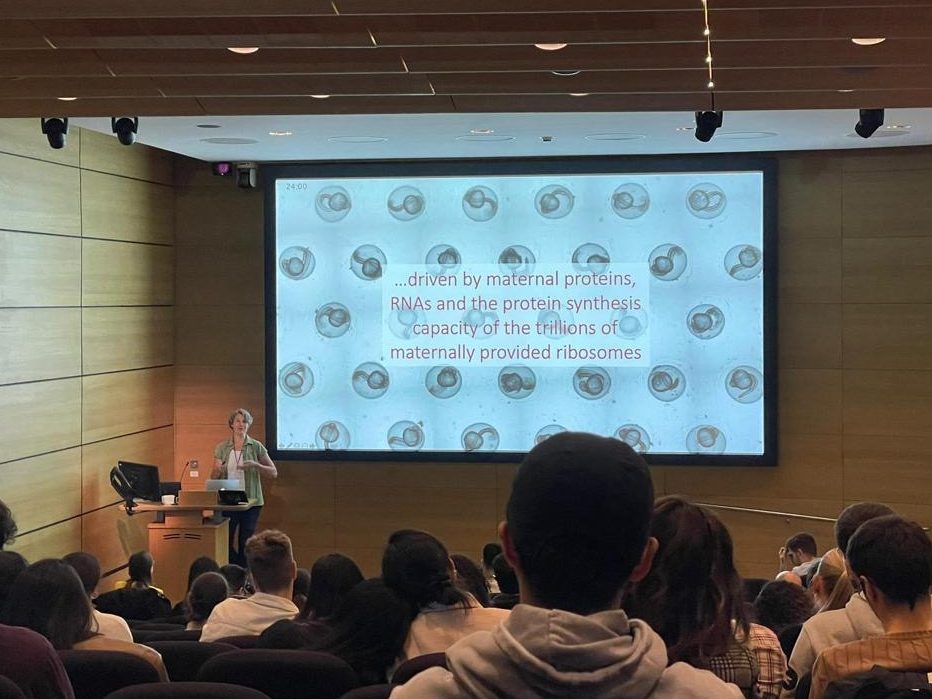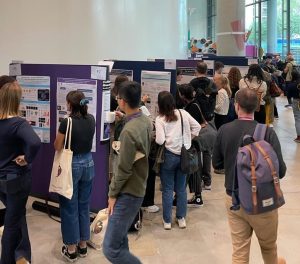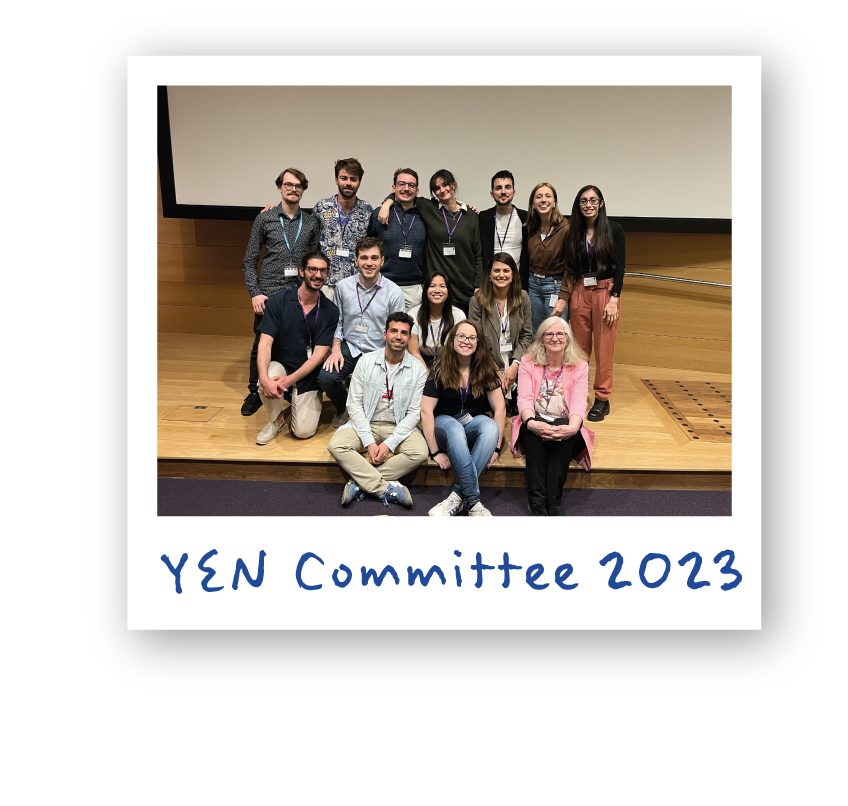Meeting report- 2023 Young Embryologist Network Conference
Posted by Ioakeim Ampartzidis, on 12 June 2023
By Ioakeim (Makis) Ampartzidis, Courtney Lancaster, Danielle Liptrot, and Rosie Marshall
Happy Birthday YEN!
The Young Embryologist Network (YEN) turns 15 this year. YEN serves as a vibrant platform for knowledge exchange and collaboration, with a particular emphasis on showcasing the work of early career researchers (ECRs — postdocs and PhD students). It has been 15 years full of inspiring science and what better way to celebrate than with a debrief of this year’s fantastic conference:
Hot Off the Press: Scientific Talks
Pre- and peri-implantation development was a particular focus in the scientific talks this year, highlighting the drive to improve in vitro embryo work relating to fertility. Two of the invited speakers presented impressive work on the subject: Katsuhiko Hayashi from Osaka University kicked off the day with an impressive overview of his ground-breaking work on reconstructing oogenesis from pluripotent stem cells, which he hopes will be used to save the endangered Northern White Rhino (only two females of this species remain); Andrea Pauli from the Institute of Molecular Pathology in Austria later showed us her fascinating work on how closely related species prevent interspecies fertilisation (in the case of zebra- and medaka-fish, it’s just one protein expressed on the egg!)
Many of the selected talks also focused on these early stages of development: Chloe He showed us how deep learning and non-invasive imaging of cleavage-stage human embryos can help us to study how cell arrangement affects blastocyst quality; Johanna Gasler demonstrated the requirement of orphan nuclear receptors on early development and zygotic genome activation in murine embryos; Lessley Sepulveda-Rincon produced apoptosis-deficient primordial germ cells in mouse chimeras to understand their functional incorporation to the mouse embryo; Zukai Liu presented the specification of extra-embryonic mesenchyme in primate development, at a genome level revealing ape-specific attributes.

Once again, YEN showcased the wide range of fascinating organisms used in developmental biology research. Michael Emmerson revealed how zebra finches can detect sound cues to alter their growth rate in utero (including expert impressions of zebra finch heat calls)! The utility of the old favourite Drosophila was once again on show, with Gloria Jansen’s impressive talk on how paternally inherited transposable elements alter penetrance of germ cell loss. O. fusiformis, a bilaterally symmetrical organism, is another neat model on which Allan Carrillo-Baltodano studies dorso-ventral patterning. Finally, zebrafish once again lived up to its reputation as a beautiful model for imaging, with Agatha Ribeiro da Silva utilising the model to study endothelial cell migration defects in heart development.
Wrapping up the short talks was the final invited speaker, Laura Pellegrini. She is a current postdoc in Madeline Lancaster’s lab who is soon moving to King’s College London to start her own group. She showed us how choroid plexus organoids have a wide range of applications, from a drug screening system to test whether drugs can cross the blood-CSF barrier, to a model for studying viral infection of the brain. Certainly ground-breaking work and we look forward to seeing how her group progresses!
Sammy Lee Memorial Lecture
The final talk of the day was the Sammy Lee Memorial Lecture, which was established to remember Sammy and to reflect on his contributions to developmental biology and his passion for inspiring the next generation of scientists.

Sammy was a visiting professor in Cell and Developmental Biology at University College London (UCL), whose life-changing work was responsible for outstanding advancements in reproductive health and fertility. Sammy started his scientific journey with a PhD at UCL, where he was working on nerve muscle interaction. Not long afterwards, Sammy became interested in developmental biology. This led to his work on gap junctions in mammalian embryos where he discovered a link between gap junction communication and early embryonic development. He then became a clinical embryologist in 1985, helping to perform some of the UKs first egg donations, before being appointed as the scientific director of the Wellington IVF department. Sammy’s team was the first in the UK to perform gamete intrafallopian transfer (GIFT), pioneered a method of mechanical assisted hatching in the UK to improve chances of in utero implantation and produced the world’s first virus free ICSI (intra-cytoplasmic sperm injection) baby to a HIV discordant couple.
Fitting with Sammy’s character, the Sammy Lee Memorial Lecture was delivered by Henrik Kaessmann who entertained us with the wonders of sex chromosomes. He drew our attention to the small size of the Y chromosome which has a striking feature of chromosome wide gene decay. He then discussed gene dosage across different evolutionary lineages from mammals to birds.
It was Sammy’s wish to present a medal to a young developmental biologist on the merit of scientific communication and outstanding research. The 2023 Sammy Lee medal for best short talk was awarded to Clara Munger, who impressed the judges with her presentation about marmoset amnion specification. She told us about her work using marmoset embryonic stem cells to make spheroids in a microgel culture system, and how this system can be used to interrogate signalling pathways required for lineage specification in the post-implantation embryo. The runner-up went to a fantastic talk from Ashley Libby who discussed progenitor cell dynamics and gene regulatory networks during neural tube development.
Poster Sessions

The day was split up by two fantastic poster sessions in the morning and afternoon, with over 30 posters being presented both in person and online. The topics ranged from sea urchin larval skeletogenesis to the identification of unwanted genetic variants in stem cell populations, having implications in evolution, developmental biology and regenerative medicine. In addition, it was excellent to see projects being presented from a range of early career researchers, from master’s students to senior postdocs. The diversity in presenters and topics incited long discussions in both poster sessions, making it difficult to coax everyone back to their seats. It will certainly be exciting to see what collaborations were spawned in these sessions, and how it will influence the direction of developmental research in years to come.
With all the excellent projects being presented, it was surely a hard decision for the judges to award the poster prize and runner up. That being said, on observing the work of prize winner – Francisco Manuel Martin-Zamora – and runner up – Adiyant Lamba – it is evident their projects are both deserving of recognition. Francisco, a PhD student at Queen Mary University, presented his work on how epigenetics may underpin temporal shifts in the diversification of larval and bilaterian life cycles. Adiyant, also a PhD student based at the University of Cambridge, described the heterogeneities which influence early cell fate decisions between the inner cell mass and the trophoectoderm. The future of these two young embryologists is very bright!
Perspectives: EDI Awareness in Academia
A refreshing addition to the science-rich day was the addition of scientific perspective sessions, introduced by the committee in 2022. This year, the focus was on Equity, Diversity, and Inclusion (EDI) in science, raising awareness for the importance of embracing EDI in scientific meetings.
This year’s perspective experts Alison Forbes, Head of Inclusion at The Francis Crick Institute in London, UK, and Rafael Galupa, a social entrepreneur and group leader at the Centre for Integrative Biology in Toulouse, France, shared their valuable perspectives on the topic. They focussed on the current state of underrepresentation in science and offered practical strategies to enhance inclusivity. When asked how ECRs can realistically improve diversity, Alison suggested to “[…] start with self-education. Read some books and listen to podcasts;” while Rafael encouraged us all to “[…] find a way to contribute that is aligned with their personality and availability”. By prioritizing EDI in scientific meetings, we collectively advance knowledge and ensure that the science we all love and care about reflects the full spectrum of human perspectives and capabilities. For a more in-depth conversation on this topic, read this interview with Alison and Rafael.
The faces behind YEN 2023
A big shout-out to the organising committee of YEN Conference 2023, for their hard work, fresh ideas, and organising skills. This year’s chairs Foteini and Jeremie along with the fantastic team of Michelle, Sergio, Jack, Ollie, Luca, Ferran, Olivia, Oliver, Matyas, Jesus, Mint, Claudia, Irina, and Christos, celebrated the 15th birthday of Young Embryology Network with a memorable Conference. The team is composed mainly from PhD students and ECRs based in London and if you like to learn more about their journey follow them on twitter @YEN_community.



 (No Ratings Yet)
(No Ratings Yet)